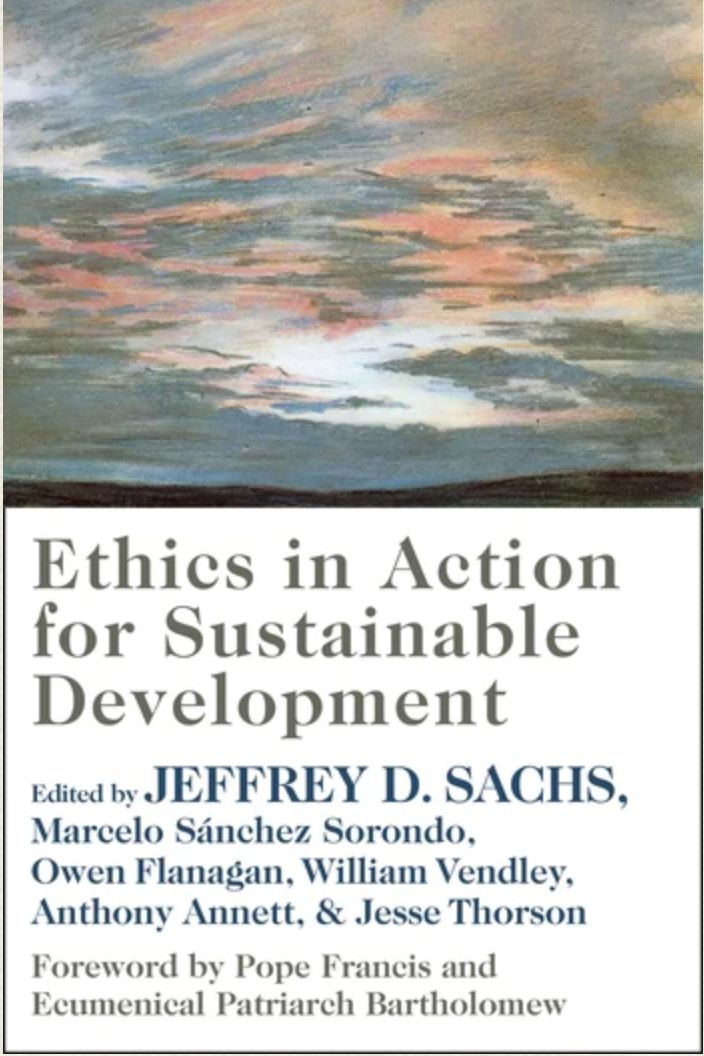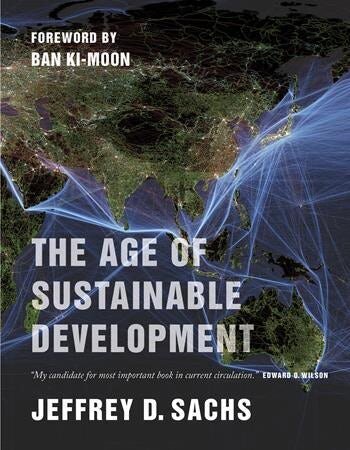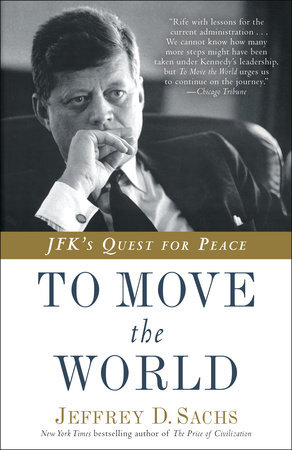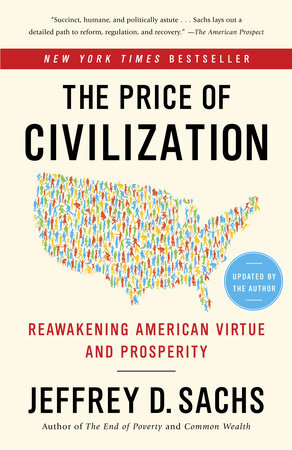Books
Ethics in Action for Sustainable Development (2022)
The Sustainable Development Goals, adopted by the United Nations in 2015, comprise an ambitious and sweeping agenda that unites economic, social, and environmental aims. What resources do the world’s religious and secular traditions offer in support of these objectives? Which principles do these traditions hold in common, and how can these shared values help advance global goals?
This book presents an in-depth and deeply engaged conversation among interfaith religious leaders and interdisciplinary scholars and practitioners in pursuit of an ethical consensus that could ground sustainable development efforts. Drawing on more than two years of close-knit discussions convened by Jeffrey D. Sachs and Marcelo Sánchez Sorondo, it offers an extensive and inclusive vision of how to promote human flourishing. The book features theological, philosophical, and ethical deliberations of great diversity and depth on the challenges of sustainable development, addressing questions of poverty, environmental justice, peace, conflict, and the future of work. It includes consensus statements on the moral imperatives of sustainable development, introductions to seven major religious traditions and their conceptions of the common good, and thematic reflections. Wide-ranging and urgent, this book represents a major contribution to interreligious dialogue and to the articulation of a shared global ethics.
The book features a foreword by Pope Francis and Ecumenical Patriarch Bartholomew.
The Ages of Globalization:
Geography, Technology, and Institutions
(2020)
Today’s most urgent problems are fundamentally global. They require nothing less than concerted, planetwide action if we are to secure a long-term future. But humanity’s story has always been on a global scale. In this book, Jeffrey D. Sachs, renowned economist and expert on sustainable development, turns to world history to shed light on how we can meet the challenges and opportunities of the twenty-first century.
Sachs takes readers through a series of seven distinct waves of technological and institutional change, starting with the original settling of the planet by early modern humans through long-distance migration and ending with reflections on today’s globalization. Along the way, he considers how the interplay of geography, technology, and institutions influenced the Neolithic revolution; the role of the horse in the emergence of empires; the spread of large land-based empires in the classical age; the rise of global empires after the opening of sea routes from Europe to Asia and the Americas; and the industrial age. The dynamics of these past waves, Sachs demonstrates, offer fresh perspective on the ongoing processes taking place in our own time—a globalization based on digital technologies. Sachs emphasizes the need for new methods of international governance and cooperation to prevent conflicts and to achieve economic, social, and environmental objectives aligned with sustainable development. The Ages of Globalization is a vital book for all readers aiming to make sense of our rapidly changing world.
A New Foreign Policy: Beyond American Exceptionalism (2018)
The American Century began in 1941 and ended on January 20, 2017. While the United States remains a military giant and is still an economic powerhouse, it no longer dominates the world economy or geopolitics as it once did. The current turn toward nationalism and “America first” unilateralism in foreign policy will not make America great. Instead, it represents the abdication of our responsibilities in the face of severe environmental threats, political upheaval, mass migration, and other global challenges.
In this incisive and forceful book, Jeffrey D. Sachs provides the blueprint for a new foreign policy that embraces global cooperation, international law, and aspirations for worldwide prosperity—not nationalism and gauzy dreams of past glory. He argues that America’s approach to the world must shift from military might and wars of choice to a commitment to shared objectives of sustainable development. Our pursuit of primacy has embroiled us in unwise and unwinnable wars, and it is time to shift from making war to making peace and time to embrace the opportunities that international cooperation offers. A New Foreign Policy explores both the danger of the “America first” mindset and the possibilities for a new way forward, proposing timely and achievable plans to foster global economic growth, reconfigure the United Nations for the twenty-first century, and build a multipolar world that is prosperous, peaceful, fair, and resilient.
Building the New American Economy: Smart, Fair, and Sustainable (2017)
In this passionate and powerful book—part manifesto, part plan of action—the renowned economist Jeffrey D. Sachs offers a practical strategy to move America, seemingly more divided than ever, toward a new consensus: sustainable development. Sustainable development is a holistic approach that emphasizes economic, social, and environmental objectives in shaping policy. In focusing too much on economic growth, the United States has neglected rising economic inequality and dire environmental threats. Now, even growth is imperiled.
Sachs explores issues that have captivated the nation and political debate, including infrastructure, trade deals, energy policy, the proper size and role of government, the national debt, and income inequality. Not only does he provide illuminating and accessible explanations of the forces at work in each case, but he also presents specific policy solutions. His argument rises above the pessimism born of political paralysis, economic stagnation, and partisanship to devise a brighter way forward, achievable both individually and collectively. In Building the New American Economy, Sachs shows how the United States can find a path to renewed economic progress that is fair and environmentally sustainable.
The Age of Sustainable Development (2015)
Jeffrey D. Sachs is one of the world's most perceptive and original analysts of global development. In this major new work he presents a compelling and practical framework for how global citizens can use a holistic way forward to address the seemingly intractable worldwide problems of persistent extreme poverty, environmental degradation, and political-economic injustice: sustainable development.
Sachs offers readers, students, activists, environmentalists, and policy makers the tools, metrics, and practical pathways they need to achieve Sustainable Development Goals. Far more than a rhetorical exercise, this book is designed to inform, inspire, and spur action. Based on Sachs's twelve years as director of the Earth Institute at Columbia University, his thirteen years advising the United Nations secretary-general on the Millennium Development Goals, and his recent presentation of these ideas in a popular online course, The Age of Sustainable Development is a landmark publication and clarion call for all who care about our planet and global justice.
Visit our supplemental materials page for additional teaching materials for students and instructors, including chapter summaries, key concepts, problem sets, and slides.
To Move the World: JFK's Quest for Peace (2014)
The last great campaign of John F. Kennedy’s life was not the battle for reelection he did not live to wage, but the struggle for a sustainable peace with the Soviet Union. To Move the World recalls the extraordinary days from October 1962 to September 1963, when JFK marshaled the power of oratory and his remarkable political skills to establish more peaceful relations with the Soviet Union and a dramatic slowdown in the proliferation of nuclear arms.
Kennedy and his Soviet counterpart, Nikita Khrushchev, led their nations during the Cuban Missile Crisis, when the two superpowers came eyeball to eyeball at the nuclear abyss. This near-death experience shook both leaders deeply. Jeffrey D. Sachs shows how Kennedy emerged from the Missile crisis with the determination and prodigious skills to forge a new and less threatening direction for the world. Together, he and Khrushchev would pull the world away from the nuclear precipice, charting a path for future peacemakers to follow.
During his final year in office, Kennedy gave a series of speeches in which he pushed back against the momentum of the Cold War to persuade the world that peace with the Soviets was possible. The oratorical high point came on June 10, 1963, when Kennedy delivered the most important foreign policy speech of the modern presidency. He argued against the prevailing pessimism that viewed humanity as doomed by forces beyond its control. Mankind, argued Kennedy, could bring a new peace into reality through a bold vision combined with concrete and practical measures.
Achieving the first of those measures in the summer of 1963, the Partial Nuclear Test Ban Treaty, required more than just speechmaking, however. Kennedy had to use his great gifts of persuasion on multiple fronts—with fractious allies, hawkish Republican congressmen, dubious members of his own administration, and the American and world public—to persuade a skeptical world that cooperation between the superpowers was realistic and necessary. Sachs shows how Kennedy campaigned for his vision and opened the eyes of the American people and the world to the possibilities of peace.
Featuring the full text of JFK’s speeches from this period, as well as striking photographs, To Move the World gives us a startlingly fresh perspective on Kennedy’s presidency and a model for strong leadership and problem solving in our time.
The Price of Civilization: Reawakening American Virtue and Prosperity (2012)
In this forceful and impassioned book, Jeffrey D. Sachs offers a searing and incisive diagnosis of our country’s economic ills, and an urgent call for Americans to restore the core virtues of fairness, honesty, and foresight as the foundations of national prosperity. Sachs finds that both political parties—and many leading economists—have missed the big picture, profoundly underestimating globalization’s long-term effects and offering shortsighted solutions. He describes a political system that is beholden to big donors and influential lobbyists and a consumption-driven culture that suffers shortfalls of social trust and compassion. He bids readers to reclaim the virtues of good citizenship and mindfulness toward the economy and each one another. Most important, he urges each of us to accept the price of civilization, so that together we restore America to its great promise. The Price of Civilization is a masterly road map for prosperity, founded on America’s deepest values and on a rigorous understanding of the twenty-first-century world economy.
Improving Access and Efficiency in Public Health Services (2010)
with Nirupam Bajpai and Ravindra H. Dholakia
This book presents a systematic mid-term evaluation of the processes of the National Rural Health Mission (NRHM), India's biggest rural health program. Data from District Level Health Surveys (DLHS), National Family Health Surveys (NFHS) and Sample Registration System (SRS) as well as primary data collected from field surveys and interviews with health functionaries have been utilized for undertaking empirical analysis in the study. It discusses the challenges and successes of the Mission with the help of extensive field observations, data analysis, and inputs from experts on health and nutrition sectors focusing on maternal, newborn, and child health issues and chronic diseases.
The book draws from data collected in field visits in the three states of Madhya Pradesh, Uttar Pradesh, and Rajasthan. After assessing the NRHM processes and progress achieved so far, it discusses important ground realities, identifies the gaps and bottlenecks in the implementation of the Mission and recommends corrective actions.
The book will be useful for all those concerned with the issue of health and public administration in general and rural health in particular, such as, NGOs, IGOs, journalists, columnists, public policy planners, civil servants, and other practitioners.
Common Wealth: Economics for a Crowded Planet (2008)
In Common Wealth, Jeffrey D. Sachs-one of the world’s most respected economists and the author of The New York Times bestseller The End of Poverty– offers an urgent assessment of the environmental degradation, rapid population growth, and extreme poverty that threaten global peace and prosperity. Through crystalline examination of hard facts, Sachs predicts the cascade of crises that awaits this crowded planet-and presents a program of sustainable development and international cooperation that will correct this dangerous course. Few luminaries anywhere on the planet are as schooled in this daunting subject as Sachs, and this is the vital product of his experience and wisdom.
Poverty, AIDS and Hunger: Breaking the Poverty Trap in Malawi (2006)
with Anne C. Conroy, Malcolm J. Blackie, Alan Whiteside, and Justin C. Malewezi
Using the experiences of Malawi, one of the poorest countries on the African continent, to illustrate both the challenges that poverty creates, and the opportunities for change that exist. Poverty, AIDS and Hunger outlines an easily-replicable model, at modest cost, that could lift people quickly out of poverty, with sustainable benefits.
The End of Poverty: Economic Possibilities for Our Time (2005)
Hailed by Time as one of the world’s hundred most influential people, Jeffrey D. Sachs is renowned for his work around the globe advising economies in crisis. Now a classic of its genre, The End of Poverty distills more than thirty years of experience to offer a uniquely informed vision of the steps that can transform impoverished countries into prosperous ones. Marrying vivid storytelling with rigorous analysis, Sachs lays out a clear conceptual map of the world economy. Explaining his own work in Bolivia, Russia, India, China, and Africa, he offers an integrated set of solutions to the interwoven economic, political, environmental, and social problems that challenge the world’s poorest countries.
Ten years after its initial publication, The End of Poverty remains an indispensible and influential work. In this 10th anniversary edition, Sachs presents an extensive new foreword assessing the progress of the past decade, the work that remains to be done, and how each of us can help. He also looks ahead across the next fifteen years to 2030, the United Nations’ target date for ending extreme poverty, offering new insights and recommendations.
Poland’s Jump to the Market Economy (1993)
An insider's analysis of the political events and economic strategy behind the country's swift transition to capitalism and democracy
In Poland's Jump to the Market Economy, Jeffrey Sachs provides an insider's analysis of the political events and economic strategy behind the country's swift transition to capitalism and democracy. The greatest challenges to economic reform, Sachs points out, have been primarily political in nature, rather than social or even economic. Sachs reviews Poland's striking progress since the start of the economic reforms three years ago, which he helped to design. He discusses the gains - more than half of employment and GDP is now in the private sector, exports to Western Europe have more than doubled, and economic growth and confidence are returning - as well as the serious problems that remain - high unemployment, a chronic fiscal deficit, the slow pace of privatization of large industrial enterprises, and the fragility of multiparty coalition governments.Sachs points out that leadership is crucial to economic reform in a newly democratic setting, as is the West's timely economic assistance. In Poland's case, the Zloty Stabilization Fund and the two-stage debt cancellation have been essential to keeping the reform program on track. Poland's example has had a powerful impact on reforms throughout the region, including the former Soviet Union, and has done much to dispel the fear that the citizens themselves, allegedly made lazy by decades of socialism, would reject the competitive rigors of a market economy. Overall, Sachs remains firmly convinced of the potential for successful economic reforms in Poland and the rest of the region.
Macroeconomics in the Global Economy (1993)
By Felipe Larraín B. and Jeffrey D. Sachs
This textbook is written for the core intermediate macroeconomics course which forms an essential part of all economics degrees. The authors reflect the continually changing debate in macroeconomics by stressing the great variety of possible macroeconomic outcomes, rather than a single theory. More importantly the book reflects a new revolution in macroeconomics that an open economy approach is essential to the study of the subject. The previously ascendant closed economy approaches have ignored the fact that, for many countries, trade and capital flows between countries are a dominant, if not the dominant influence on the national economy.
Global Linkages:
Macroeconomic Interdependence and Cooperation in the World Economy (1991)
by Warwick J. McKibbin and Jeffrey D. Sachs
With the rapid deterioration of the U.S. trade balance in the 1980s, the United States was forced to finance deficits by borrowing heavily from the rest of the world. In doing so, the United States went from being the world’s largest creditor country to the world’s largest debtor, while Japan and West Germany experienced a rise in trade surpluses. Such a shift in international trade flows has had profound effects on the world economy.
McKibbin and Sachs address a range of issues involving macroeconomic imbalances in the world economy. Through the use of a new simulation model of the world economy they explore how policy actions undertaken in one country affect the trade flows and macroeconomic patterns among the other counties. The authors show that key macroeconomic features of the 1980s can be explained by shifts in monetary and fiscal policies in the major economies and by supply shocks due to changes in oil prices.
In addition to showing how the global macroeconomic experience can be understood, they focus on a number of current policy issues, including the reduction of global trade imbalances, the consequences of U.S. fiscal consolidation, the effects of an oil price shock, the implications for the U.S. economy of increases in Japanese and German fiscal spending, the effects of targeting exchange rates among the major currencies, and the gains of increased coordination of macroeconomic politics among the major economies. In several cases, their conclusions are shown to be quite different from those that form the basis of many conventional views. The authors also analyze the importance of interaction between policymakers in industrial economies and conclude by reemphasizing the need for U.S. politicians and policy experts to recognize that macroeconomic results in the U.S. now depend heavily on events abroad.
Economics of Worldwide Stagflation (1985)
by Michael Bruno and Jeffrey D. Sachs
This book sets forth both a theory and a comparative empirical analysis of stagflation, that peculiar combination of high unemployment, slow growth, and spurts of high inflation bedeviling the advanced industrial nations during the past fifteen years.
The authors first construct a small macroeconomic model that takes full account of aggregate demand and supply forces in the determination of output, employment, and the price level, in both a single-economy and a multi-economy setting. They then apply the model to provide an understanding of comparative performance of industrial countries in the areas of unemployment, inflation, productivity, and investment growth. They argue convincingly that the decay of the major economies during this period resulted from the supply shocks of the 1970s, such as the two major OPEC oil-price increases, and from the consequent policy-induced decrease in demand in response to inflationary pressures. Their analysis differs markedly from similar studies in that it takes specific account of institutional differences in the labor markets of the various economies. This helps to explain in particular the divergent adjustment profiles of the United States and Europe.
Michael Bruno and Jeffrey D. Sachs make several key recommendations for the mix of demand management and incomes policies necessary to combat stagflation in individual countries as well as for the coordination of macroeconomic policies among the major industrial nations.















